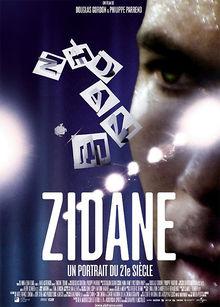I was watching football yesterday, and chatting with friends remotely during the match, as so many of us do in these pandemic lockdown socially atomised days. It occurred to me that the narrative arc of a particular player, struggling for form, hitting the post, his anguish and despair, then eventually relief and the breakthrough of scoring, would make an interesting visual focus.
I was, in short, reminded of the 2006 documentary Zidane: A 21st Century Portrait, in which some seventeen cameras were directed solely upon the mercurial Real Madrid player during a match against Villareal. It’s an intriguing piece of cinema. On the one hand, it’s hypnotic, with its somnolent score by Scottish band Mogwai. On another, it’s the juxtaposition of Zidane’s concentration, and isolation, against that of the various groups of fans around the world, who appear in the half-time segment of the movie.

Of course, this was too good an experimental film idea to be original. There is nothing new and good under the sun. The original version of this idea was, astonishingly, made in 1970 and released the following year. Entitled Fussball Wie Noch Nie, or Football as Never Before in English, it was directed by the relatively obscure German new wave director, Hellmuth Costard, who is probably best known, or most notorious, nowadays for his early short in which an ejaculating penis recites the German morality law relating to movies.

Costard’s version follows George Best of Manchester United in his 1970 pomp, playing against Coventry City. Like the Zidane movie which emulates it, it isolates and focuses upon the individual genius in a team sport, generating a flowing image which is simultaneously utterly alienating, because so distanced from how we ordinarily spectate upon sport, and also so utterly familiar, because it is how we live life, as individuals performing our role as part of a greater, more complex whole, of which we only witness our corner.

This both is and is not the George Best we are familiar with, in other words. It is not, obviously, the Miss World dating George, the Carnaby Street fashion George, the drunk George on Wogan’s sofa, the alcoholic George, the wifebeating George. These Georges are real and true and fragments of a larger life, but are not the focus of why Best is an international icon.
This is football George, the subject of the witticism: Maradona good, Pele better, George Best. Allegedly the most talented player ever, or asserted so in some quarters at least. This is George doing what the world loved him for, playing soccer. But it is not how we are used to seeing him play. This is tightly focused on him alone. We see how much he shambles about, turning this way and that, occasionally perplexed, strolling, then breaking into a brief run, then stopping. The game, in other words, is elsewhere, or rather, it mostly takes place beyond our focus. He is only intermittently part of it. Here is a five minute clip, complete with a soundtrack, Football, by Manchester band Arficeden, to give you a sense of Costard’s vision.
It is perhaps too much to extrapolate out from this unusual and now obscure documentary to derive wider conclusions. Yet this is refreshing and familiar. Gone are the implicit negative narratives which always seem to hover in the background like a dropdown menu about George, the drinking, the womanising, the sad squandering of talent and ultimately life. We know they are there, but they are not here.
Instead we are treated to George doing what he did best, if you’ll pardon the pun. George the footballer. George on the pitch. But it’s not what we thought it was. It’s George on the pitch almost from his own point of view, how it feels to BE George on the pitch. And it’s a confusing wander back and forth, seemingly aimless, speeding up and slowing down, mostly a bystander in his own narrative.
In some ways, this is the real experience of George as footballer. But it’s not the one we’re familiar with, and perhaps not one we’re comfortable with either. As I said, it’s too much to extrapolate from this, but it seems a metaphor for life is in there, waiting for us to see it.
At the very least, Costard’s documentary, his way of presenting football as never before, is a reminder that narrative frame underpins all the stories we tell ourselves about reality. And in this era of fake news, alternative facts and ideological echo chambers, it’s good to be reminded of that from time to time.
